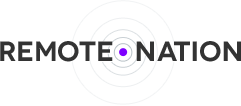
Remote Nation had the chance to speak with Paul Hartge of RevolutionEHR, the COO of a completely remote software company that has grown from small, modest beginnings to a country-wide operation. They offer cloud-based electronic health records for optometrists while solely connecting to their customers and employees via phone, skype, and the internet.
RevolutionEHR is now home to over 100 employees and Paul gave us some insight on the challenges and benefits of being a growing remote business, what steps they currently take to stay connected with everyone in the company and why they decided to not get an office.
Let’s start with the basics, what is RevolutionEHR? When did you guys start?
We are a software company that provides electronic health records for optometrists. The company was founded in 2007.
Did you work remotely before RevolutionEHR or have you worked in an office? If so, what was change like?
My previous job was out of Toronto and I worked remotely for about five years prior to RevolutionEHR. Before that I worked in an office for nearly 20 years. Initially, the change required more rigid and careful planning for meetings since the impromptu office meeting was out of the question. I did find it easier to focus without all of the distractions that come with an office setting, though.
What were the reasons behind starting a company remotely? Any big factors or was it just a desired quality with you and the rest of the team?
Each of the founders was in a different city, so no one really wanted to make the bet on relocating. A lot of the work could be done independently among people as well. But mostly it was because all the founders were in different cities. And we didn’t have any money to fund an office.
Can you tell me about the process you and your team underwent from start-up to a now well established company and how being remote played into that process? Was it a challenge or a gift?
We have 100 employees now all working out of their houses, so there was a need for technology solutions once we got to ten or fifteen people. We built a custom collaboration tool for posting information. It is an internal collaboration tool called “nerve center.” People can blog and communicate on it. It can be serious content or fun stuff. Everything from human resources to March Madness will be posted on it. It is sort of like a Facebook, but just for us. It is definitely helpful for introducing new employees. Just an overall good way for people to stay connected.
As we got bigger and bigger we needed to plan more physical meetings, so depending on the groups, we schedule quarterly or annually meetings. We do an annual meeting once a year in January where everyone gets together to plan for the next year. It’s like a beginning of the year kick off. Other than that, smaller groups will meet a couple times a year. We probably have employees in 20 states or so it is hard to get everyone together in one place.
Down the line, it became apparent that we didn’t want to open an office, so when we hire new people there is the expectation that they are willing to always work remotely. So that may limit us to certain demographic, but we have the ability to pull from people across the whole country
Now that you guys are out of startup mode, what are your reasons for staying completely remote?
A couple things, one it would be hard to bring everything together since we are so spread out. And now it would be just kind of weird since we are so used to operating in a remote situation.
From a recruiting perspective, we can hire anyone from everywhere, which I think it is a huge staffing advantage. We hire support personnel from optometry offices to have that insight. To try and hire all those people in one area would be extremely difficult. To be able to hire across the country is a huge advantage.
With 100 employees it must be hard keeping in touch with everyone. What are some strategies you use to keep in contact with everyone and manage them remotely?
The technology aspect is definitely important. Skype, google, Grasshopper, those are all important for keeping in touch with everyone. But just as important, we like to empower our workers to be self-motivated and self-managing. It allows for a nice distribution of work.
Any downsides with remote working that people should know if they are looking into remote work?
From an individual’s perspective, I always try to make sure that people are aware of the social aspect of it. There is a bit of isolation, physically. The social aspect is taken out of it. The communication is all done online. So people that go on lunch breaks or coffee breaks with you is taken out of the mix most of the time. You also have to prepare yourself from the distractions at home. Working at home is not an alternative for the need for day care.
On an organizational level, the biggest difficulties, depending on the type of the business, is the perception that if you don’t have an office you aren’t a “real company.” You have to keep in mind how you present yourselves to potential investors, clients and other companies so that you look like a real company and not a fake company! We do all of our customer selling and support online, so there is no reason for physical meetings. But if you need that physical aspect, the external image is important.
Any distractions at home?
Yeah, depending on your office environment there can be stuff that gets in the way. But it really comes down to how disciplined you are.
What are things that keep you focused?
I think the work itself keeps me focused. There are no real specific steps I take to make sure that I am focused. There is so much to do in a startup environment. I find it easier to focus when there aren’t people around. I just think of things that I need to do during the day and I just start cranking!
Any technology you use that you just can’t live without now?
We live and breathe in Skype all day long. We use GoToMeeting a lot. We use Salesforce extensively. We use Grasshopper too, which is a virtual phone system. But I am on Skype all day long. That is the one that I really couldn’t live without.
Do you like to listen to music at home when working?
Rarely, sometimes when I am doing really mundane work I will. But I am on the phone much of the day, so generally I don’t listen to music.
With so many people all working remotely, has there been any funny stories worth sharing?
There are the usual funny stories of people not realizing that the webcam is on and regretting that later. But there was a particular situation that caught us off guard.
One customer’s software implementation wasn’t going well. There were just issues with the setup. So the unhappy customer looked on our website and came across the address where our physical mail was going to at the time. Since we had no office, this address was one of the owner’s home addresses! The customer Google-Earthed the address to see where the company was “located” and they got a house with a big lawn and a swimming pool! So that did not go over well with. I highly recommend a P.O. Box for remote startups.
***
If you’d like to learn more about RevolutionEHR, be sure to visit their site @ http://www.revolutionehr.com/















